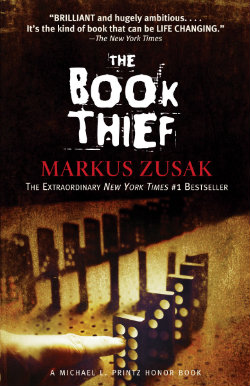 I read The Book Thief because I felt like I had to: there’s a movie coming out that I thought I might like to see, and it’s all over Tumblr. I was convinced that I’d hate it for being sappy and preachy, but I started reading it, and my opinion slowly changed. I decided to give it a chance.
I read The Book Thief because I felt like I had to: there’s a movie coming out that I thought I might like to see, and it’s all over Tumblr. I was convinced that I’d hate it for being sappy and preachy, but I started reading it, and my opinion slowly changed. I decided to give it a chance.
It’s about a family of Germans at the height of Nazism and the Holocaust. They sympathize with the Jewish victims and hide a man named Max in their basement. Things, as you can imagine, go wrong, though not necessarily in the way you probably suspect. And so on.
So. I got exactly what I expected. This book is over-sentimental and preachy. I said on Goodreads that I wasn’t sure I’d be able to finish it with my eyes rolled so far back in my head. Zusak pulls out all the stops. (I guess I should add a spoiler alert here.) Death, the narrator, announces well before the end of the novel that almost everyone but its protagonist, Liesel, dies in an air raid one night while they’re sleeping. Liesel happens to be in her family’s basement, writing what will essentially become The Book Thief. Meh. Death describes going from house to house, body to body, and gently lifting out each soul, including that of Liesel’s foster father and her best friend, Rudy. So she’s pulled out of the rubble and sees what happened and freaks out. If Death’s tour of bodies isn’t enough, Liesel has to have her own, and she cries over each one individually. And Death sees that Liesel sees the soul of her foster father (who she calls Papa) stand up and play the accordion in front of her. Cry, cry, cry, he says to the reader. Even before this, Liesel sees her friend Max, the Jewish man they had been hiding in their basement, in line, headed for Dachau. She yells at him and causes a scene, and everyone gets hit and whipped. Cry, cry, cry, again.
I knew exactly when I was supposed to cry because Zusak makes it crystal clear that that’s exactly the response he’s eliciting. It’s a flamboyant call to sorrow. It was so blatant that I cringed instead of cried. I sighed. I rolled my eyes. I groaned and read through to the end as quickly as I could because it was just dumb.
I’ve said before how much I hate preachy, sentimental books, and this one is right up there with The Unbearable Lightness of Being on my Hatred List (though it’s not quite at the level of Amerika or Things Fall Apart, which I might call my Mortal Hatred List?). For a while, I thought I might like The Book Thief, and then it got cornier and cornier and more sentimental at the end. Another spoiler alert: Liesel likes to steal books from the mayor’s wife’s library. The wife knows about it, and it’s really okay. She had a kid who died in a war, and she’s all broken and miserable, and she likes that Liesel is around. That family is one of the few around with any money and a nice house with a library. Guess who Liesel goes to live with after her foster family dies in that air raid? I’ll give you one guess. I just threw up a little in my mouth. Disgusting and sickly sweet. Urrgh.
Have I made it clear that I don’t like this novel? I didn’t think I would, but then I was hopeful for a while. I had a feeling things might go badly because it’s all over Tumblr in the sentimental book quotes, but I thought it was worth a try. And it totally wasn’t; it just annoyed me. (This is why I won’t read John Green. He seems to write sentimental teenage fiction like this, and as good as everyone says he is, I’m skeptical. Sorry, Palmer.)
Now. I hated this book because I hate this kind of book. It’s not that it’s bad, if that’s what you’re into. Lots of people like The Unbearable Lightness of Being and Every Book by Paolo Coelho (Look at the front page of his website! What a humble guy. :/), for example. I can’t stand anything about them, either, and for the same reason. But if you like the sickly sweet, sentimental, preachy kind of book, go for it. Just leave me out.